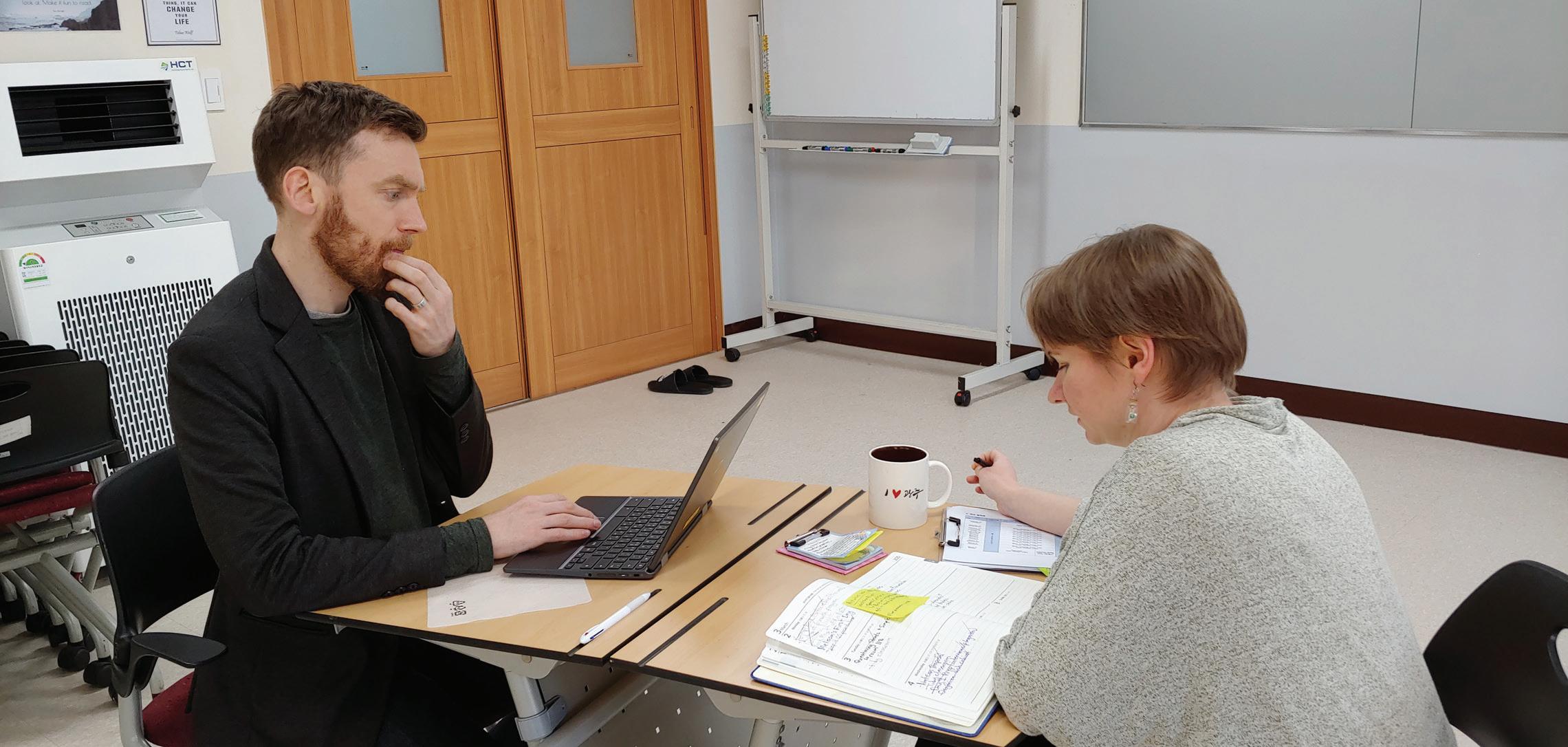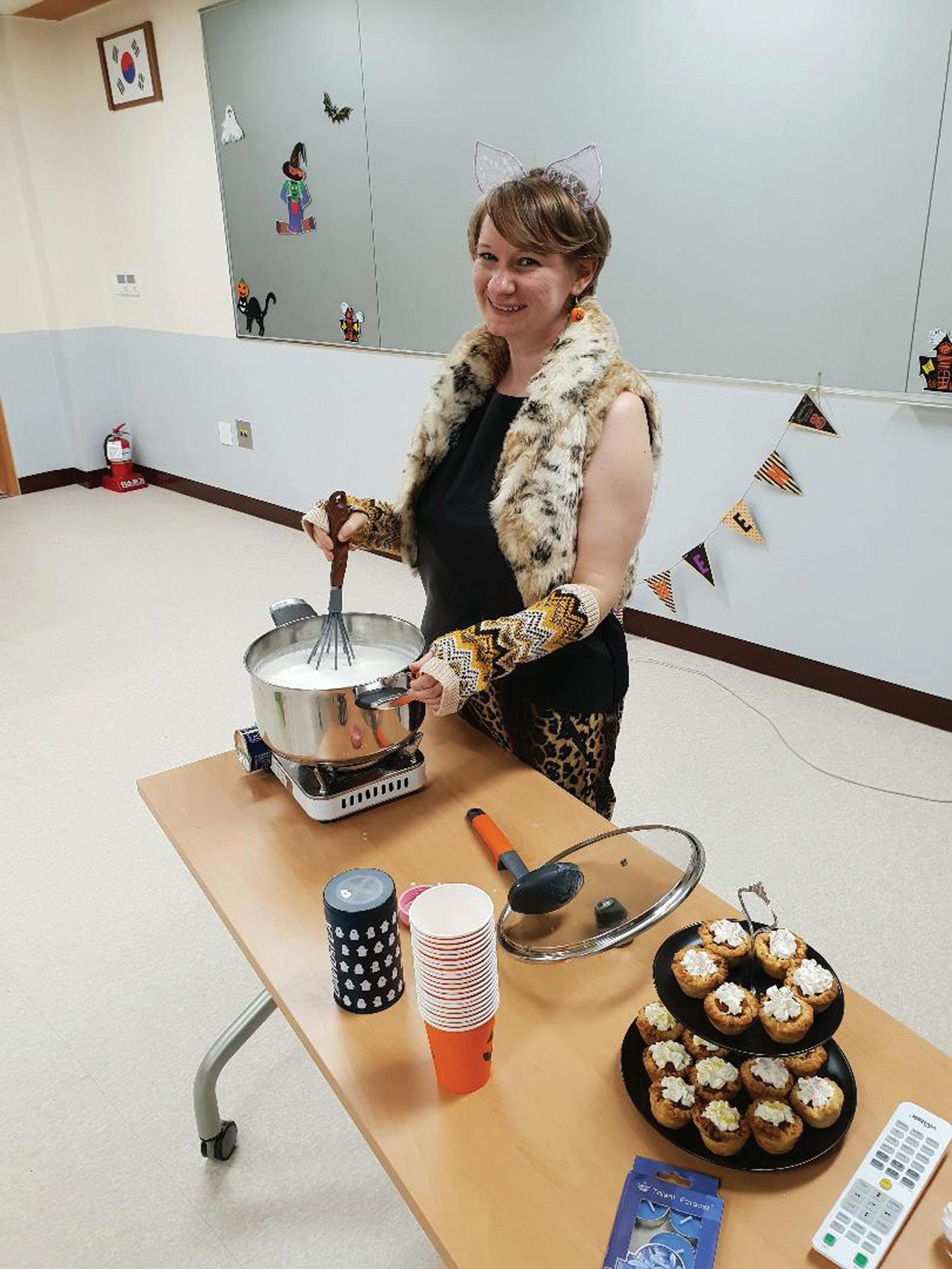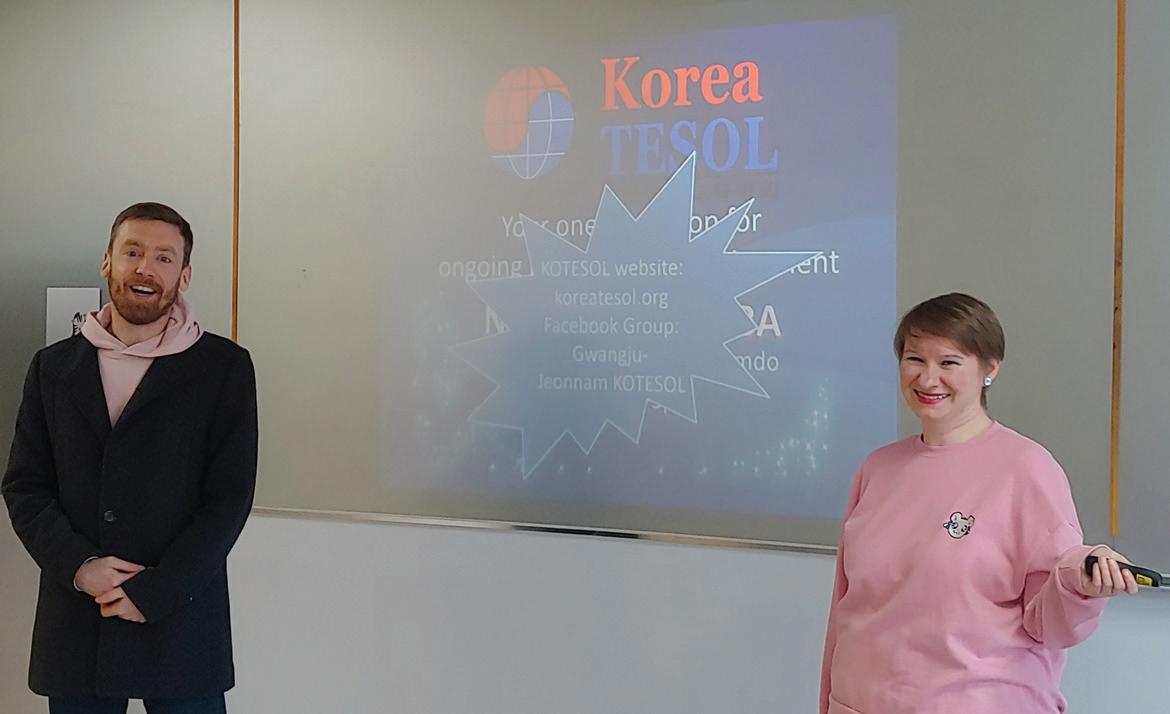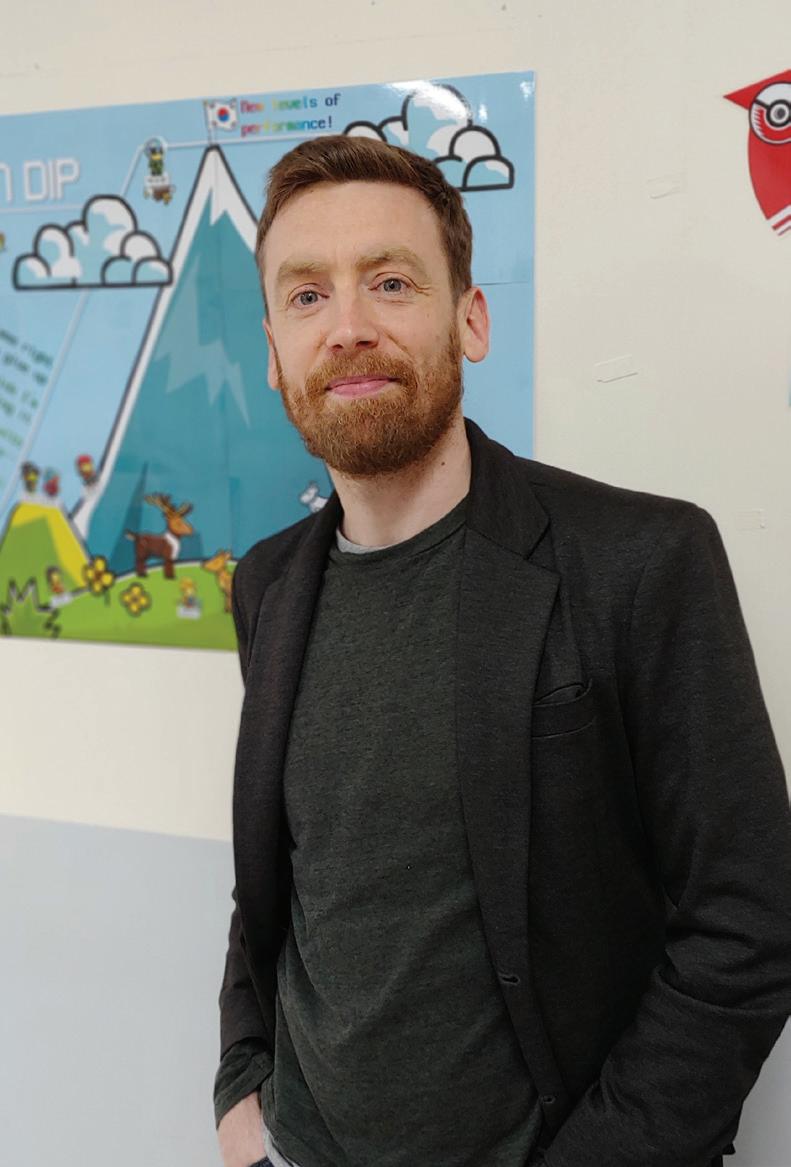
18 minute read
Language Teaching: Teacher Training at JIEI
Teacher Training at JIEI
The Jeollanamdo International English Institute
Advertisement
Interview by Dr. David E. Shaffer
In this issue of the Gwangju News, we have decided to interview two members of the GwangjuJeonnam Chapter of KOTESOL who are teacher trainers at the Jeollanamdo International Education Institute (JIEI). The JIEI is a government-funded training center in Yeosu serving the entire province and is now in its second year of operation. Kristy Dolson and Peter Lucarotti graciously agreed to this interview to tell us about JIEI and their teacher-training experiences there.
Gwangju News (GN): I’d like to first thank you both for so happily agreeing to do this interview. Could you start by giving us a bit of information about your lives before Korea? Kristy: It’s an honor to be interviewed by the Gwangju News, thank you for the opportunity. Korea has really shaped who I am and how I think of myself as a person and as a teacher, so I think it’s safe to say that I had no life before Korea. Peter: Thank you for reaching out to us for an interview. I’ve been in Korea for a while now, so it’s honestly a bit difficult to think about what I was doing before moving here. I’m originally from the east coast of Canada and moved out west to pursue a career in journalism. That didn’t work out, and Korea allowed me to move my life in a different direction. I’m incredibly grateful for that opportunity.
GN: What brought you to Korea, and what did you do before joining the teaching staff at the Jeollanamdo International Education Institute (JIEI)? Kristy: I figured out in middle school that I wanted to live in Asia, and teaching English overseas seemed like the best way to attain that goal, so I attended Brock University’s Concurrent Education program to test my passion for teaching. After graduating with my Bachelor of Education in 2011, I applied to the Jeollanamdo Language Program (JLP). I taught for five years in the Foreign Language Center of Hwasun Elementary School, which turned out to be a perfect training ground for teaching EFL and provided enough downtime to allow for the pursuit of my personal and professional goals. Peter: Honestly, I never had any intention of living abroad. I moved to British Columbia to study journalism and began working as a sports writer at a daily newspaper. Unfortunately, I got into that business just as the 2008 recession hit and that whole industry went through really tough times. I was lucky to keep my job, but the hours were insane. It reached a point where it was obvious that I couldn’t keep going. Korea offered me a chance to reassess what I wanted to do. I had friends in Beolgyo who spoke highly of the JLP program. I was placed in Boseong at the Girls’ Middle School. I taught there for seven years before taking time off to study Korean and spend some time with family back home. I started at JIEI the following summer (in 2018).

GN: Why did you decide to move from teaching English learners to training English teachers? Kristy: To be honest, when I left the Foreign Language Center [in Hwasun], I thought my EFL journey in Korea was over. I figured I’d gone just about as far as someone who wasn’t inclined to get a master’s could go. And then, while I was back in Canada trying to figure out my next step, a colleague reached out and suggested I apply for the position at the Jeollanamdo Education Training Institute (the pre-cursor to JIEI) that she would soon be leaving. It was the job of my dreams! So it wasn’t so much
Kristy and Peter planning out activities for the upcoming camp program at JIEI. The institute hosts 20 three-day camps over the course of the school year.

a conscious decision as a well-timed opportunity. Peter: It was a well-timed opportunity for me as well. I was going through the process of getting hired through EPIK when I saw the posting for the JIEI positions on Facebook. It seemed like a step up on what I had been doing and, after teaching mostly by myself for seven years, it was a chance for me to be a part of a team with other teachers, and that appealed to me.
GN: Where do the teachers come from that you train at JIEI? Kristy: The Korean English teachers (KETs) come from all over the province of South Jeolla and the native English teachers (NETs) come from the major English-speaking countries of South Africa, USA, Canada, England, and Australia/New Zealand.
GN: What kind of training programs does JIEI offer and how long are the training programs? Kristy: We offer a lot of different training programs. Our biggest – and best, in my humble opinion as head teacher – is the six-month Intensive English Program for KETs. Secondary KETs come from all over the province to immerse themselves in English language study and practice, while also learning about new teaching methodologies with the goal of taking them back to their schools when they complete the program. Throughout the year, we also run three- to five-day English workshops for primary and secondary KETs, principals and vice principals, and administrative staff. Our team of native instructors is also largely responsible for giving presentations and watching teaching demos during the JLP and TaLK orientations. Peter: Kristy and I have also given presentations at the first two professional development meetings that were held for re-signing NETs in the JLP program. The teacher trainers here also alternate teaching an eight-week course to any Yeosu citizens interested in learning English. The JLP and TaLK coordinators also play a big role in that.
GN: I know that it’s difficult to make generalizations, but what would you say are some of the biggest differences in training Korean English teachers and expat English teachers? Peter: Despite having some PD meetings and orientation presentations, we don’t do a ton of teacher training with expats. With that being said, however, I haven’t found there to be much of a difference. Most of the teachers that I’ve worked with, whether Korean or expat, have been receptive to new ideas and teaching methodology. The biggest difference has been in the level being taught (elementary, middle, high school), or the age of the teacher, as I’ve found that older teachers tend to have a harder time with educational technology.
In my experience, another difference is that the Korean English teachers usually have more constraints placed on them by the school curriculum and what they have to teach. There have been times where I’ve thrown out an idea for a lesson or suggested some educational technology to try, and I was either told directly in class or pulled aside afterwards (always kindly, of course) and told why it wouldn’t work in the context of a Korean classroom. It’s actually been a great eye-opener for me. I think it can be easy to make incorrect assumptions given some of the criticisms a lot of expats have about the

Kristy brewing up pumpkin chai lattes for Halloween Culture Night at JIEI.
GN: We often talk about “magical moments” that occur in the EFL classroom. Have you had similar moments during teacher training classes? Kristy: The moment when KETs realize they don’t need to provide constant verbal English input to their students. This is called “running commentary,” and it occurs all the time in EFL classes. The teacher narrates the class by verbalizing everything he, she, or the students are doing. This is simply not necessary because it’s overwhelming for language learners. They need time to think in silence. But most teachers are very uncomfortable with silence in the classroom – especially a language classroom – so this takes a while to sink in. But when it does, it’s a real magical moment.
Peter: I teach writing and educational technology. Trainees tend to love the latter but overwhelmingly list the former as their least favorite thing to teach and as something they hated in their own language learning. Writing is important though: It gives students time to think and really use the grammar and vocabulary they’ve been taught. I try my best to give the teachers at JIEI writing activities that are engaging and fun regardless of age. It’s always great to see teachers have fun with a writing activity, especially when they produce something that’s so good they even surprise themselves!
GN: Which area or areas of English skills or teaching methodology do you feel that your trainees are most in need of improving? Kristy: As the micro-teaching instructor, my biggest focus is giving simple and clear instructions for activities that have a big language payoff. I spend a lot of time working with the trainees on simplifying their language and analyzing textbook activities in terms of engagement and of setup versus payoff. If teachers reflect on these two areas, they can see a lot of improvement in their classes.
Peter: I think there’s room for improvement in how writing activities are approached. I like to show trainees how they can scaffold writing activities from word to sentence and, finally, to paragraph level to help students reach their learning objectives. Also, I like to show how things like visual supports in activities such as a picture walk activity can help give students the boost they need to produce fun, and more importantly, coherent stories.
GN: How receptive are your teacher trainees to being taught? Is there a sense among them of “I’m a teacher, I don’t need training”? Kristy: There have been a few cases of that, certainly. But for the most part, the KETs who apply to our program are highly motivated to improve themselves and help their students achieve success. Peter: Yes, I agree with Kristy.
GN: What’s the most difficult part about doing inservice training, and are you glad that you made the move from teaching EFL? Kristy: Like I said earlier, teacher training is my dream job, so it’s really tough to identify “the most difficult part” without veering into “petty complaints” territory. I guess

Kristy and Peter introducing KOTESOL to new NETs during the most recent orientation at JIEI. Kristy presented on questioning strategies and simple activities, while Peter taught an introductory Korean class.
I’d have to say how critical it is for me to stay up to date on the latest research, methodology, and technology for education. Keeping current with education trends so that I can better serve the KETs and NETs who attend our programs can seem like an impossible task on days when I’m struggling to just clear all the basic responsibilities from my plate.
Peter: I’m glad I made the move over to teacher training. It’s been a challenge, and I feel I’m a better educator as a result. I do want to get back into the EFL classroom, however. Both have their pros and cons, but – despite the classroom management issues that can arise – I miss seeing students have that ah-ha moment when they really get something they didn’t understand before.

43 I really want to thank you and the people of KOTESOL for creating and maintaining that community of “teachers helping teachers.”
Peter: Getting to the monthly KOTESOL meetings prevents me from getting apathetic about my professional development. There’s such a wide variety of subject matter in the presentations that I’m constantly being challenged in different ways. Even the smaller presentations like “swap-shop,” where people quickly share ideas and activities, have been hugely beneficial. It’s been a great networking tool as well, as you’re surrounded by experienced educators every time you go. Finally, being a part of the local chapter has helped motivate me to get to the national and international conferences as well, which have been fantastic for a number of reasons. I’m grateful to be a part of the KOTESOL community. It has helped me immeasurable in the nearly two years I’ve been a member. It’s something that I can’t recommend strongly enough to other teachers here. Thank you for reaching out to us and giving us the opportunity to talk about this with others!
GN: And I thank both of you for the wealth of information you have provided about teaching teachers and about the JIEI programs. It sounds like teaching and taking courses at JIEI are both highly rewarding experiences.
Peter Lucarotti in his writing and educational technology classroom at JIEI.
GN: As you are both active members of KOTESOL, I would like to ask how being a member might have impacted you and your teaching?
Kristy: Luckily, as an active member of KOTESOL, I can take a lot of that work and responsibility off my shoulders by attending the monthly meetings in Gwangju. I joined KOTESOL in 2013, and being a member has brought immense benefits to my personal and professional life. Not only have I grown my support and resource networks, but it’s also given me multiple opportunities to share my experiences and expertise, allowing me to really grow into the career EFL teacher that I am today.
GWANGJU-JEONNAM KOTESOL UPCOMING EVENTS
Check the chapter’s webpages and Facebook group periodically for updates on chapter events and online activities.
For full event details: Website: http://koreatesol.org/gwangju Facebook: Gwangju-Jeonnam KOTESOL
The interviewer David Shaffer has been a resident of Gwangju and professor at Chosun University for many years. He has been with KOTESOL since its early days and is a past president of the organization. At present, as vice-president of the Gwangju-Jeonnam Chapter of KOTESOL, he invites you to participate in the teacher development workshops at their monthly meetings. Dr. Shaffer is presently the chairman of the board at the Gwangju International Center as well as editor-in-chief of the Gwangju News.
Written by William Urbanski
Every year, Webster’s Dictionary includes a few new words, officially recognizing them as part of the English language. Some of these, like buzzy or gig economy, make quite a bit a sense, while others such as gocup are just ridiculous. The bookworms over at Webster’s seem to have forgotten the first half of the old adage “out with the old and in with the new,” which means it is up to me to propose my picks for words and terms that are so misused and overused that they should forever be struck down from the English language and the common consciousness. Bro – There exists considerable confusion and, quite frankly, willful blindness surrounding the appropriate context in which to use this word. Derived from the word “brother,” it is often and ineffectively used in an attempt to make one’s English sound more colloquial. Bro is a quite questionable word for anyone to use, but it is especially problematic for EFL speakers for a number of reasons. First of all, it is one of the more context-dependent words that I am aware of. Generally, when used between native speakers, there is an understanding that its use is purposefully ironic, harkening back to one summer in the 1980s when the word was part of the common vernacular. Second, bro is a clear example of a word belonging to a sociolect; that is, it identifies an individual as a member of a certain group. Are most EFL learners seventeen-yearold surfers from California? I do not think so. Last and most importantly, bro implies a very high level of social familiarity, which causes further problems for speakers of languages like Korean (and many European languages, for that matter) where things like social status and age are coded into language use. So, how could a non-native speaker reasonably be expected to deduce if he is socially close enough to someone to warrant calling him bro? In conclusion, if you see me on the street, please remember that I ain’t your “bro.” Incentivize – I feel conflicted about this word because it actually sounds pretty cool. As well, I used to employ this word on occasion before reading the book What Money Can’t Buy by Michael J. Sandel. Sandel explains that the problem with incentivize is that it is actually an economic term that has been misappropriated into other spheres of life. The word has a rich and storied history dating back to the earliest works of Maynard Keynes, the father of modern-day economics, in the 1950s, from which point its usage has only increased. In economic terms, an incentive is a reward (usually financial) that promotes a certain behavior. In essence, it means that the more you pay someone, they more they will work. Here is an example: Let’s suppose a person gets 500 won for each piece of gum they scrape off the sidewalk. If one day the payment goes up to 5000 won per piece, it is reasonable to expect that more people will be willing to perform this unfulfilling job. On the surface, this idea makes a lot of sense, and one could be forgiven for assuming that paying people will result in more people performing any activity or unpleasant task. Alas, this is where economic theory diverges from reality. In What Money Can’t Buy, Sandel explains how Switzerland, which heavily relies on nuclear power, needed a place to store nuclear waste. Naturally, few people would welcome a nuclear waste site in their neighborhood, yet the residents of certain suitable areas were willing to accept the sites as part of their civic duty. After all, they and all their fellow countrymen were the beneficiaries of nuclear power. All the “bros” and “holla-back” girls gotta know that “incentivizing” the following words is “unacceptable.”
To be fair, I am not completely opposed to the locution itself, as long as it is used as a prefix and not a standalone word. Bromance? Fine. Are you a scientist conducting an experiment using bromide? Fair game. Do you like movies starting Josh Brolin? Me, too. But for crying out loud, please stop calling me “bro” the second time we have met. “Bud,” “buddy,” “homeslice,” and “man”: These are all viable and perfectly innocuous alternatives to the term “bro.”

Economists, who wanted to study the impact of financial incentives on the number of people welcoming the sites, spoke to these residents. Even when offered substantial amounts of money, the number of people willing to accept the sites actually decreased!
This happened because there are certain things we, as members of society, do because they are either societal norms or they are just the right things to do. Nobody pays us to do these things, but if someone did, it would “crowd out” our sense of civic responsibility and result in us doing them less, not more. As well, countless experiments have shown that paying people to lose weight, stop smoking, or read more books is effective at the start, but as soon as the payments stop, people revert to their old behaviors. In this sense, certain activities are immune and even resistant to rewards!
Most people are probably unaware of the denotation and increasingly complex connotations of the word “incentivize,” so here is a little trick to help you remember: Just do not use it.
Unacceptable – This word has just gotta go. No other word in the English language reeks of self-aggrandizing arrogance as this one. To even utter this nonsense, mishmash of letters when referring to someone’s behavior is a clear sign of stupidity. When someone says that something is “unacceptable,” it is clear that he or she has no linguistic aptitude or the ability to parse even the simplest of ideas or concepts. Using this judgemental and emotionally charged word requires two erroneous presuppositions: First, that the speaker is in a superior enough position to make a condemnation; and second, that others care what he or she thinks.
The only fathomable correct usage of this terrible word is when it refers to an object that does not fit into a physical space. If by some cruel twist of fate, this word were to remain in the English language, an imagined proper use of the term would be along the lines of “The can was too big to fit into the trash receptacle. The can was unacceptable.”
The other thing that drives me absolutely up the wall with this word is that it sounds so stuffy and makes the speaker sound so self-important when there are so many awesome-sounding alternatives: horrendous, atrocious, gnarly, egregious, and lousy, just to name a few. Even the very formal and technical-sounding suboptimal spares the speaker from sounding like a sanctimonious harridan.
Holla-Back Girl (HBG) – The female equivalent of bro has all the stigma of its male counterpart with none of the concision. When all you ladies out there are “raising the roof ” at the club and grab the DJ’s microphone so that you can “shout out” and “give mad props” to your HBGs, you sound ridiculous. Please just stop using this term.
So those are my choices of words that have not stood the test of time and need to be summarily eschewed from the English language. There are a few other words that I think push the limits of uselessness, such as proactive and inappropriate, but that is an issue for another article. Until then, I would like to leave you with a quote from Mr. Mark Twain: “The difference between the almost right word and the right word is really a large matter – it’s the difference between the lightning bug and the lightning.”

Graphics by William Urbanski The term “Holla-Back Girl” (HBG) has its genesis in the unfortunate musical exploits of the early 2000s. The above picture shows a HBG in her traditional regalia.
The Author William Urbanski, managing editor of the Gwangju News, has an MA in international relations and cultural diplomacy. His preferred appellative is not bro. Instagram: @will_il_gatto










